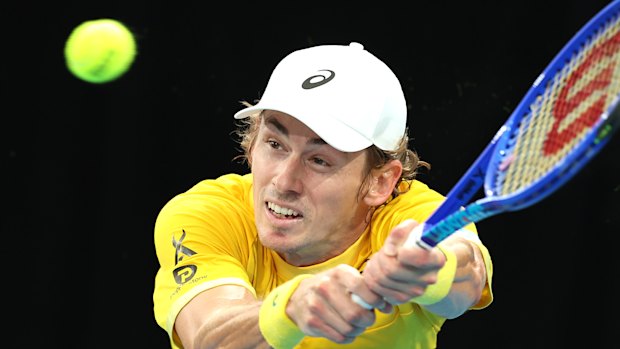Not allowed a medical time-out because cramping is deemed to be the result of a “lack of conditioning”, Collignon took his cap off and appeared to be walking to the umpire’s chair to shake hands during that first game of the third set.
But the world No.91 changed his mind, played on, fended off six break points and heroically battled to the biggest win of his career.

Australia’s Alex de Minaur.Credit: Getty Images for ITF
“It feels amazing. I thought I wouldn’t be able to finish,” Collignon said.
“I tried to play with that strength, tried to go for it, focus on the serve and I don’t know how I won. Yeah, crazy.
“I think when you play for your country there is no pain.”
Loading
Playing for his country and riding high two weeks after taking down dual grand slam finalist and world No.12 Casper Ruud at the US Open, it was understandable why Collignon did not wish to surrender.
While hoping teammates Sander Gille and Joran Vliegan can take down Australian Cup debutant Rinky Hijikata and Olympic gold medallist John Peers in Sunday’s doubles to secure Belgium the tie, the warrior said he would play on one leg if required for the reverse singles.
In what could yet be the deciding rubber, Collignon is slated to play Thompson, presuming Australian captain Lleyton Hewitt keeps the faith with his No.2 following a deflating loss to Bergs.
Should Australia win the doubles, de Minaur will have the chance to level the tie against Bergs as the 2022 and 2023 Davis Cup runners-up bid to qualify for the Final 8 in Italy in November.
The only times Australia have won from 2-0 down were in the 1939 final and in 2015, when Hewitt inspired a famous comeback in the quarter-finals against Kazakhstan in Darwin.
AAP

